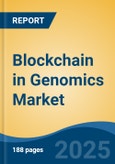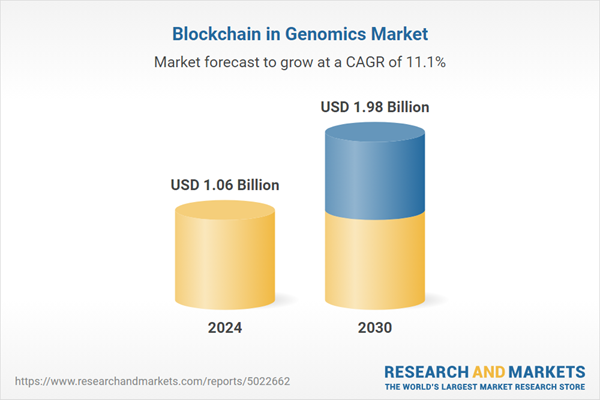Speak directly to the analyst to clarify any post sales queries you may have.
10% Free customizationThis report comes with 10% free customization, enabling you to add data that meets your specific business needs.
This highlights the growing emphasis on tailoring treatments based on individual genetic, biomarker, or molecular profiles to improve therapeutic outcomes and reduce adverse effects. Each block is timestamped and linked to the previous one, forming an immutable chain that cannot be altered retroactively. This decentralized framework allows data to be distributed across a network of interconnected systems without relying on a central authority, enhancing transparency and reliability. With global accessibility enabled through proper authorization, users maintain control over their data, ensuring privacy and security.
Key Market Drivers
Rising Investment by Private Players and Venture Capitalists
Increased investment provides researchers and innovators with the financial resources needed to explore and develop blockchain solutions tailored for genomics. This funding supports the creation of new platforms, tools, and applications that leverage blockchain's capabilities. For instance, in March 2024, MENADNA Inc., a prominent bioinformatics and genetic testing startup focused on the Middle East and North Africa (MENA) region, announced an exclusive partnership with Nebula Genomics, a leader in personalized genome sequencing. Under this agreement, MENADNA becomes Nebula's exclusive partner in Jordan, Oman, and Iraq. Currently active in the UAE, MENADNA also plans to expand into Saudi Arabia.The collaboration aims to enhance the region’s representation in genomic research by combining Nebula’s cutting-edge sequencing technology with MENADNA’s proprietary bioinformatics platform, addressing a long-standing gap in global genome-wide association studies. Financial support from private players and venture capitalists accelerates the development of blockchain-based solutions for genomics. This leads to quicker advancements in technology, making blockchain more accessible and applicable to genomic research and data management. Funding supports the development of robust and scalable blockchain infrastructure required to handle large volumes of genomic data securely.
This infrastructure enables efficient data storage, sharing, and analysis. Investments attract collaboration among stakeholders, including researchers, industry players, technology providers, and healthcare institutions. These partnerships foster a collaborative ecosystem that accelerates blockchain adoption in genomics. Venture capital investment fuels the growth of genomics-focused start-ups that are developing blockchain solutions. These start-ups contribute to the development of new platforms, tools, and applications, increasing the overall demand for blockchain technology. Investment in blockchain technology enables the streamlining of clinical trials, data sharing, and research collaboration.
This leads to more efficient and cost-effective research efforts in genomics. Increasing investments from private players and venture capitalists are contributing to the growth of the Blockchain in Genomic Data Management Market. Recent developments in this field, such as strategic partnerships involving pharmaceutical companies and government bodies, as well as investments from venture capital and other stakeholders, indicate the growing acceptance of blockchain platforms for the storage and management of genetic information in the healthcare industry. These collective efforts will significantly drive the market's growth in the years to come.
Key Market Challenges
Regulatory Challenges
The use of blockchain technology in genomics presents several regulatory challenges that need to be addressed to ensure compliance with existing laws and ethical standards. These challenges stem from the unique nature of genomic data, data privacy concerns, data ownership, and the decentralized nature of blockchain. Genomic data is highly sensitive and personal. Regulatory frameworks, such as the General Data Protection Regulation (GDPR) in the European Union, require strict adherence to data privacy principles.Ensuring that individuals provide informed and explicit consent for their data to be stored, shared, and used on the blockchain is a significant challenge. Blockchain's decentralized nature challenges traditional concepts of data ownership. Determining who has control over genomic data stored on the blockchain and how individuals can assert their rights over their data is a regulatory hurdle. Integrating blockchain into existing regulatory frameworks designed for centralized systems can be difficult. Regulators must adapt or create new regulations that accommodate the unique characteristics of blockchain technology.
Key Market Trends
Innovations in Technology
Innovation in blockchain technology within the field of genomics has the potential to significantly boost its demand in the future by addressing existing challenges, enhancing data management, improving research collaboration, and enabling new possibilities for personalized medicine. Innovative blockchain solutions can offer even stronger data security and privacy features, assuaging concerns about the safe storage and sharing of sensitive genomic data. This can encourage more individuals to contribute their data for research and clinical purposes. Blockchain innovations can introduce advanced consent management and data ownership mechanisms.Individuals will have greater control over their genetic data, leading to increased willingness to participate in research initiatives. Innovative blockchain platforms can facilitate secure cross-border data sharing and collaboration among researchers and institutions. This can accelerate the pace of genomics research by allowing global participation and knowledge exchange. As blockchain technology continues to evolve and new innovations emerge, the demand for its integration in genomics is likely to grow. These innovations can address critical concerns, unlock new research opportunities, and ultimately lead to improved patient care, driving the adoption and utilization of blockchain technology in the field of genomics.
Key Market Player
- Oxford Nanopore Technologies Plc
- PacBio (Pacific Biosciences of California Inc.)
- Guardtime Ltd.
- Agilent Technologies Inc.
- Illumina Inc.
- BioRad Laboratories Inc.
- 10x Genomics Inc.
- QIAGEN NV
- Nebula Genomics Inc.
- Thermo Fisher Scientific.
Report Scope:
In this report, the Global Blockchain in Genomics Market has been segmented into the following categories, in addition to the industry trends which have also been detailed below:Blockchain in Genomics Market, By Business Model:
- B2B Business Model
- B2C Business Model
- C2B Business Model
Blockchain in Genomics Market, By Service:
- Utility Tokens
- Blockchain Platforms
Blockchain in Genomics Market, By Application:
- Data Sharing & Monetization
- Data Storage & Security
- Automated Health Insurance
Blockchain in Genomics Market, By End User:
- Pharmaceutical & Biotechnology Companies
- Hospitals & Healthcare Providers
- Research Institutes
- Data Owners
- Others
Blockchain in Genomics Market, By Region:
- North America
- United States
- Canada
- Mexico
- Europe
- France
- United Kingdom
- Italy
- Germany
- Spain
- Asia-Pacific
- China
- India
- Japan
- Australia
- South Korea
- South America
- Brazil
- Argentina
- Colombia
- Middle East & Africa
- South Africa
- Saudi Arabia
- UAE
Competitive Landscape
Company Profiles: Detailed analysis of the major companies present in the Global Blockchain in Genomics Market.Available Customizations:
With the given market data, the publisher offers customizations according to a company's specific needs. The following customization options are available for the report.Company Information
- Detailed analysis and profiling of additional market players (up to five).
This product will be delivered within 1-3 business days.
Table of Contents
Companies Mentioned
- Oxford Nanopore Technologies Plc
- PacBio (Pacific Biosciences of California Inc.)
- Guardtime Ltd.
- Agilent Technologies Inc.
- Illumina Inc.
- BioRad Laboratories Inc.
- 10x Genomics Inc.
- QIAGEN NV
- Nebula Genomics Inc.
- Thermo Fisher Scientific
Table Information
| Report Attribute | Details |
|---|---|
| No. of Pages | 188 |
| Published | August 2025 |
| Forecast Period | 2024 - 2030 |
| Estimated Market Value ( USD | $ 1.06 Billion |
| Forecasted Market Value ( USD | $ 1.98 Billion |
| Compound Annual Growth Rate | 11.1% |
| Regions Covered | Global |
| No. of Companies Mentioned | 10 |









